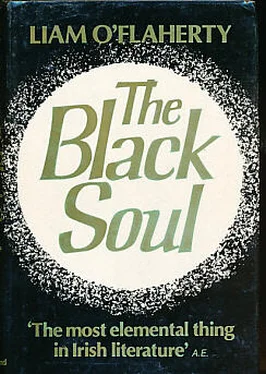All over Inverara the air was heavy with sweet smells. The wind, making slow sensuous music as it drifted slowly in from the calm sea, mixed all the smells together. It blew so tenderly that the bluebells hardly waved their heads under its caress.
Around Inverara the sea lay calm and vast like a great thought. The waves rolled slowly in on the sands at Coillnamhan. They rolled sleepily, playfully making deep channels in the sand. Then they crept back again, murmuring, ‘Summer, summer, summer.’ There was not one speck of seaweed along the whole stretch of sand. It was clean and spotlessly white, like the seagulls that strutted about it, with their heads stuck low on their shoulders, or scratching their breasts with their beaks. The sea stretched around Inverara, its back silvered by the sun, the waves so small that they seemed to be strokes drawn by a child’s finger. Beneath the cliffs on the south there was never a wave at all. The sea there was a mirror reflecting the colours of the cliffs, yellow and black and grey. Round rocks stuck from its bosom near the cliffs, and shoals of birds scurried around in it, teaching their young how to catch fish.
The sweet languorous odour of summer permeated every living thing in Inverara. The cows standing knee-deep in the brackish pools in the meadows above the beach at Coillnamhan, chewed their cud with half-closed eyes, their tails whisking at the gadflies. Horses stood in the shade of the fences, their tails to the sun, their heads drooping and a hind leg limp, dozing through the day. The men watched their crops growing. Lying in the shade, they stretched themselves languidly and said, ‘Laziness is a devilish thing.’
Nowhere in Inverara had summer so changed the face of nature as at Rooruck, and nowhere was summer so beautiful. It appealed more to the mind than to the senses, because even summer’s beauty was wild and fierce at Rooruck. It was the colour of a snake, with the snake’s ferocity. The great broad crag that stretched west and south from the village to the sea was so uniformly grey that at a distance Red John’s black sheep, licking salt from the dried shallow pools at the summit of the Hill of Fate, looked grey too. Rooruck was like the back of a giant tortoise lying in the sea. Beneath it were the tilled fields, square and oblong, and triangular patches of green potato stalks and whitening rye, surrounded by grey stone fences. While around its shores the sea swept even in summer with mighty motion. It swept in vast hollows and unbroken smooth ridges from north to south and from south to north with the tides. Like a great work of art, wrought with a few strong strokes, it lay tremendous and beautiful. It was fierce even in its languorous silence, as if it might rise any moment without warning and lash into a fury, like a caged lion that dreams suddenly of a vast forest.
In Rooruck the leap from cold gritty spring into languorous summer was the change from northern winter to southern skies. It filled the strong with lusty force. It made the weak melancholy. When the heat came, and the cuckoo’s spits were lying of a morning on the green blackberry bushes and the starlings were scurrying about with their young, Red John withdrew more and more into himself. His outburst of passion, the night of Bartly’s wedding, seemed to have robbed him of strength. He did not weed his crops. He left his pony without water or grass in a bare scorched field among the crags, until the poor animal, mad with hunger and thirst, tried to jump the fence and broke its neck. One of his sheep died eaten by maggots. Donkeys broke into his rye field and trampled the growing rye. The neighbours shook their heads and said, ‘It’s that woman has brought a curse on him. What did I tell you in the beginning?’ The whole village noticed him going about talking to himself, but neither the Stranger nor Little Mary paid any attention to him. Little Mary was growing irritable. She felt that life in Rooruck was becoming unbearable to her. Every day when she awoke she hoped that somehow the evening would see her flying to the mainland with her lover. The drear black crags maddened her. The cheerless monotony of always doing the same things, and of having her idiot husband near her, set her nerves jangling. And instead of deliverance approaching, it seemed to recede. For the Stranger, with the coming of summer, seemed to be getting cooler towards her. She saw him smile at young peasant women in the village. When he embraced her he did so without passion. He hardly ever stayed in the house, but spent the day wandering around, bathing and lying in the sun. And she would sit on a stool in front of her door, knitting with furrowed brows, wondering whether he had ceased to love her. Every time she passed a young woman of the village she would look into her face angrily, suspecting that some one of them had taken away her lover. Her sleep became troubled. She had weird dreams in which she saw her lover parted from her. And she would wake up in the middle of the night stricken with horror, thinking herself pregnant and deserted.
Every morning she intended to talk to the Stranger seriously, but now Red John would sit by the fire until the Stranger went out after his breakfast. He would do the same at dinnertime, and in the evening, when the languorous fragrance of summer was in her blood, Little Mary felt too overcome by her love to take her lover to task even when he casually embraced her. Then one morning she awoke more vexed than usual. ‘I will talk to him to-day,’ she said to herself, ‘to-day or never. I can’t go on like this. He must take me away from here or I will drown myself.’ Red John had already gone out when she got up. He always got up at dawn now, since the spring tide came, and rambled about, nobody knew where or why. But when she had kindled the fire, and smoke began to rise in a curling blue column from the cabin chimney, and she had gone to the little field below the house to milk the cow, Red John sneaked in again and sat by the fire. When she came in, he was drinking tea from a tin mug and eating a piece of oaten bread that crackled when he chewed it. While she was preparing the Stranger’s breakfast, she could see him picking the crumbs from the yellow long teeth in his upper jaw, and swallowing something in his throat. The apple in his throat, covered with greyish-red hair, protruded and receded over the ivory button at the neck of his blue frieze shirt. She would pause in the middle of the floor, passing from the table to the dresser, and look at him with hatred. The ashy colour of his cheeks, instead of arousing pity in her breast, almost made her sick with disgust. She called the Stranger to his breakfast. She heard his answering grunt, and then the water splashing in the basin as he washed his face. She became very excited, feeling certain that something definite was going to happen that day. Perhaps it was the spring tide in her blood too. The Stranger came into the kitchen, sleepily murmured ‘Good morning’ to both of them, went to the door yawning and looked out. Then he sat down to his breakfast. Red John was toying with one of his teeth that was loose, moving it from side to side, with his eyes staring vacantly at the fire, but he was saying to himself cunningly, ‘I’ll spoil their little pass-the-time-away.’ At last, when the Stranger had finished breakfast and was rising from the table, she could contain herself no longer. She turned on her husband furiously.
‘You lazy, idle lout,’ she said, ‘why don’t you go out and do something? Am I to do everything in this house? Get out and fill the watertub for the cow, before the sun splits its sides and the lathes fall off it. Get out, you vagabond, and weed your potatoes.’
But she stopped, shivering and miserable. Red John had taken no notice. He was still toying with his tooth, and the Stranger had gone out shrugging his shoulders. Then Red John, with a foolish laugh, got up and followed him. He leaned over the fence, watching the Stranger going westwards towards the shore. Then he chuckled, and taking his fishing-basket and his line he went up the crags to the Hill of Slaughter to fish.
Читать дальше












